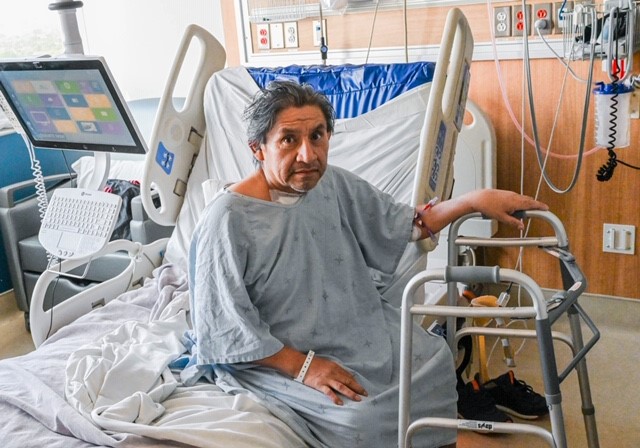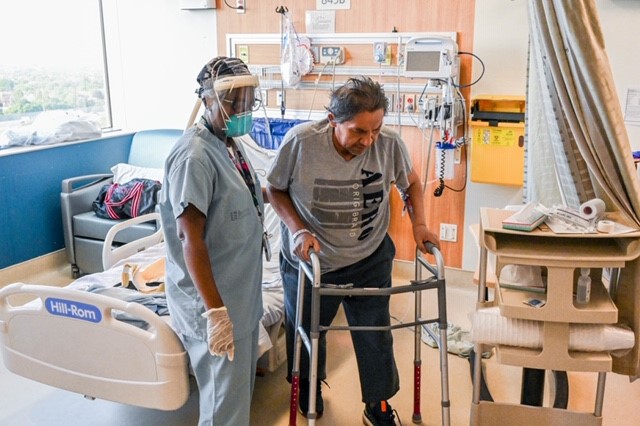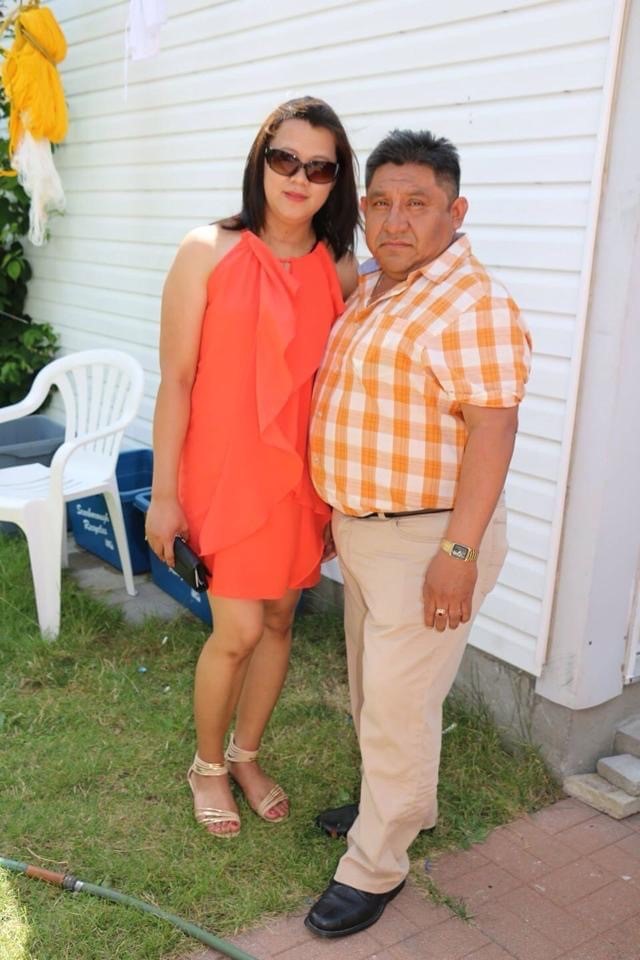Mario Castillo glances up at the sky as an occupational therapist wheels him into the courtyard behind a rehabilitation centre he will call home for the next few weeks.

“This is my second chance,” he said.
Castillo arrived at St. John’s Rehab at Sunnybrook Health Sciences Centre last week, but this is the first time the COVID-19 survivor is able to sit outside in a wheelchair and soak up the sunshine.
“This is my first time to go outside to feel the air,” he said.
The 51-year-old, originally from Mexico, recalls how his journey began.

In late March, he went to the emergency room at Toronto’s Humber River Hospital after feeling unwell.
Castillo, who works as a mechanic, left work early one day with a fever and runny nose.
He said he spent the next week in bed before a friend suggested he seek medical care.
“He had a sore throat, he had muscle pains, he was quite fatigued, so he presented to the hospital about five to 10 days after symptoms started with shortness of breath, which is what we typically see with COVID-19,” recalled Dr. Jamie Spiegelman, internal medicine and critical care specialist.
Within hours of arriving in hospital, Castillo’s symptoms worsened.

“Initially, he just required oxygen, and eventually, over the next hours to days, his respiratory status got worse where we had to put him on a breathing machine and intubate him,” Spiegelman said.
Castillo would become Humber River Hospital’s first COVID-19 patient in the intensive care unit.
“He was our first patient that got intubated with COVID-19 … our experience was zero at our hospital, but we were trying to learn from other centres,” Spiegelman said, adding: “At that time, Italy was exploding with these patients, so we had a lot of feedback from the doctors in Italy. New York was starting to get bad at that time … China … so we were learning from other places, but really, no one really knew how to treat these patients.”
Without much to go on, the team focused on basic ICU and critical care principles.

Get weekly health news
“The first week or two, I don’t think too many of us expected him to survive,” Spiegelman admitted.
The virus was, and remains, a mystery in many ways.
Castillo was hooked up to a ventilator, but his oxygen levels were decreasing, so the team thought of other ways to try and support him.
“We were also at the point where we had no real option but to prone him, so we turned him upside down on his stomach to help give him more oxygen … and it seemed to work on him. But the first couple of weeks, we had no idea if he was going to survive,” Spiegelman said.
Meanwhile, at the family home in North York, Ont., Castillo’s wife Maricar Pagulayan and her sister-in-law, who had both tested positive for the virus that causes COVID-19, were recovering in self-quarantine.
Pagulayan recalled fearing the worst for her husband.
“I was crying and keep praying, praying,” she said, adding: “I called all my family … his daughters back home in Mexico.”
The family was not able to visit Castillo due to a strict no-visitor policy at the hospital.
“I know Mario can make it. He’s a fighter, he’s a strong man … Let’s just keep praying,” she recalled telling loved ones.
At the one-month mark of being hooked up to a ventilator, the medical team decided to perform a tracheostomy to essentially reposition the breathing tube from his mouth to his neck.
That presented a new challenge, however, since it had never been done on a COVID-19 patient.
The concern was that a member of the medical team could be exposed to the virus in the process.
Knowing that it would be the best chance for survival for Castillo, the team proceeded to safely perform the procedure.
“That proved to be a godsend for him because we were able to wean the sedation because it’s way more comfortable to have a tracheostomy than have a great big breathing tube in your mouth, it reduces infection and it really makes the patient more comfortable,” explained Spiegelman.
Five weeks later, Castillo was able to breathe on his own.
He spent nine weeks attached to the ventilator.
“The first time, I’m scared because I don’t know who is the people around me,” Castillo said.
When he finally opened his eyes after 70 days, Castillo said he had to check the calendar on his mobile phone to confirm the date.
“I don’t believe,” he recalled, thinking about how much time had passed.
“His lungs are very, very damaged from COVID. He had really significant changes of his lungs,” Spiegelman said.
Incredibly, Castillo continued to show signs of improvement.

“He still has a long road to go to get back to his baseline and to get home and be functional like he wants to be, but the fact is, he survived it, and it is a miracle that he survived it to this point,” said Spiegelman.
After three months of not seeing her husband, Pagulayan was allowed a brief visit in hospital.
“Even though the nurse said ‘you cannot hug him,’ I go and grab and hug him because I miss him so much,” she remembered, adding: “I’m happy that he’s coming home soon and I hope everything will be fine now. I hope our life will go back to normal because he missed a lot.”
Outside the rehab centre, Castillo is enjoying breathing in the fresh air.
It rained in the afternoon, but now the sun is shining brightly.
He’s wearing a T-shirt and pants with a protective mask.
Castillo pointed out the shirt used to be much tighter fitting, but he has lost a lot of weight over the last two months.
As for the mask, he said he hopes everyone wears one.
“Clean your hands, don’t touch your eyes, don’t touch your mouth,” he said.
Castillo will spend the next three to five weeks at the rehab facility.
“(He is) getting out of breath really, really quickly. I see that a lot with people who are in the hospital in the ICU for a lengthy period of time. The weakness in the arm and leg,” explained Castillo’s occupational therapist, Vickie Ming. “COVID is still very new so it’s very interesting to see how it has evolved and what people are coming out with when they do come up from the ICU.”
She pointed out that Castillo’s positive attitude and dedication to getting better will help speed up his recovery.
While he is happy to be able to breathe in the fresh air, he said he is anxious to go home to his wife and get back to work as soon as possible.
“This is my goal: to walk, to be back again at work and be doing the same as I was doing before.”















Comments
Want to discuss? Please read our Commenting Policy first.